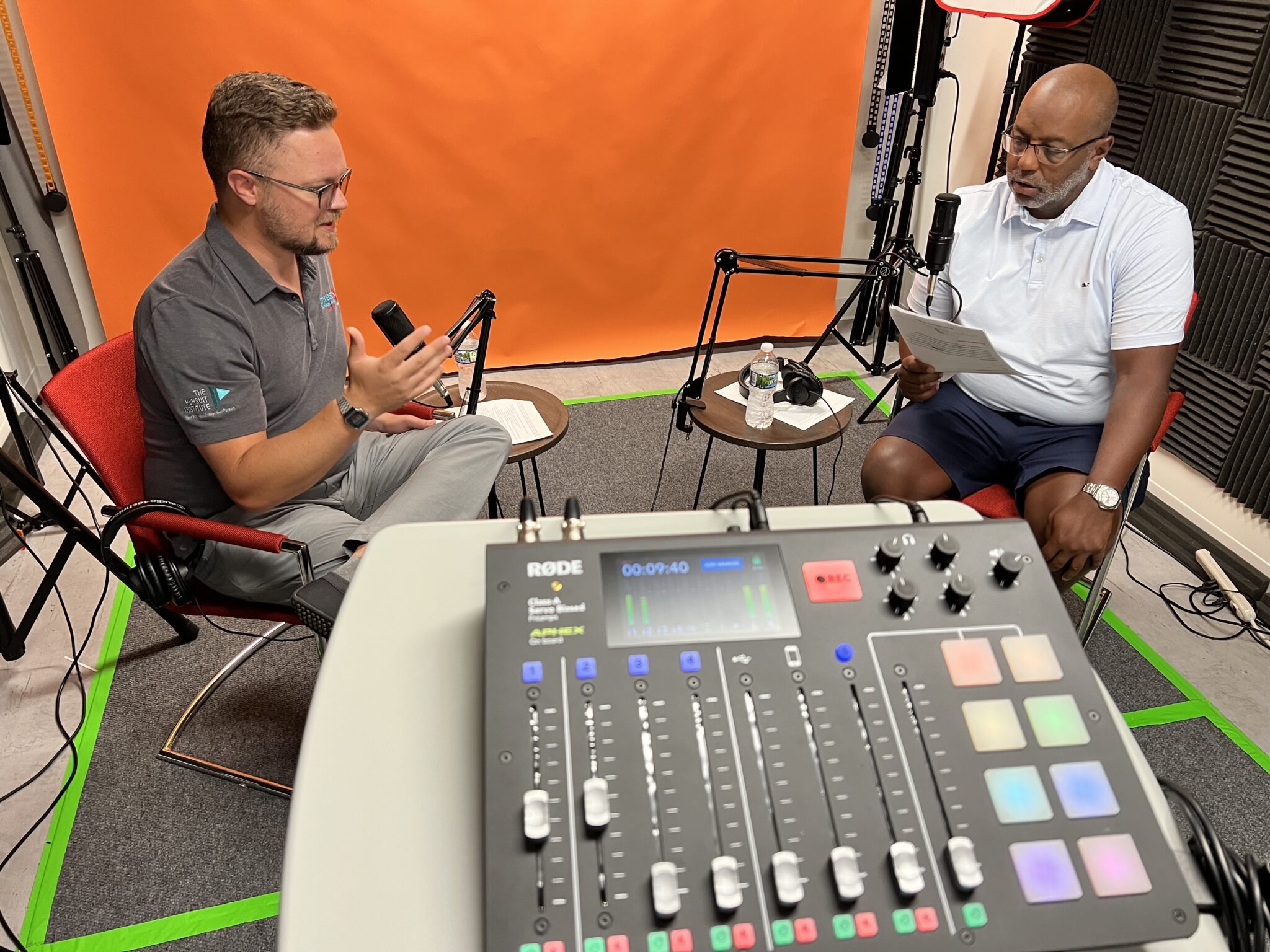Season Five of the DE Talk Podcast launched with a powerful conversation between our VP of Strategic Partnerships, Shannon Offord, and Mike Thibideau, President & CEO of Invest Hamilton County. In this episode, Mike details substance abuse’s substantial impact on the workforce, how employers can better recruit and retain individuals in early recovery and just how this issue falls under the Americans with Disabilities Act (ADA), among other insightful tidbits. Here’s a short snippet of the conversation below to pique your interest – be sure to listen to the episode to hear the rest of this eye-opening conversation!
Shannon Offord:
With so many employers hiring, can you share how employers can engage and hire job seekers that are in early recovery?
Mike Thibideau:

Mike Thibideau and Shannon Offord record the DE Talk Podcast in the DirectEmployers studio.
Well, so I think specific to early recovery, what I would say is you already probably are hiring them now. You just don’t know. Because if somebody is in early recovery, they can pass a drug test. They don’t need any accommodations. They’re an able-bodied, relatively sane member of society. If they come to you and apply for a position, they’re good to go. They shouldn’t be coming to you and saying like, “Hey, by the way, three weeks ago I was doing a lot of drugs.” That’s not like a sane thing I would recommend anybody ever say in an interview process or anything like that.
So, I think more it’s just thinking about the fact that you do have employees who are applying for these positions that probably are in these things. So, what 101 level foundational supports are you putting into place to support the health and wellbeing of all your employees that prepare you for what happens if and when somebody does disclose a need for accommodation? Because let’s say they do come to you and they say, “Hey, listen, I’m in early recovery, and I need to let you know that I’m working too many hours. I can’t go to meetings.” What do you say? Do you say, “Tough”? Because that’s illegal, so you can’t just say that.
Shannon Offord:
Can’t do that. Yeah, can’t do that.
Mike Thibideau:
Yeah, you can’t do that. You got to know. And that’s I think when we used to do a lot of our trainings around the state, and even today when I do a lot of work with employers on non-traditional talent, one of the first things we cover is ADA, FMLA, OSHA. We go through the regulations that really do say, for the most part, you have to help these people. But also, we use that to build the foundation, because if HR representatives and supervisors understand that like, “Oh, this isn’t an option we have, this is something we have to do,” then they’re more likely to just go, “Okay, this is what’s happening.”
And I think that’s the hardest part. We do have a circumstance, and I think with people in early recovery as well, where on the more social services side, we need to just get better about helping them connect to better jobs. That’s not on employers. Because, as I said, if they can pass a drug test and they’re an able-bodied individual who’s qualified for the job, on the social services side, we need to do a better job and our nonprofits need to do a better job just saying, “Hey, you know what? You’re better than the grocery store. You’re better than the gas station. You’re better than you name it. You can have a career.”
Because they really don’t believe that they can. And if we tell them, “Hey, while you get yourself into recovery and while you start this journey, this is all you’re able to do, this is all you’re good enough for.” I mean, how would that feel to hear that?
Shannon Offord:
And that’s pretty much where they’re stuck, and people keep telling them that, unfortunately.
Mike Thibideau:
Yes. And there’s a saying in recovery, like, “Nothing changes, if nothing changes.” Then I feel like at the same time, sometimes there’s a narrative of, “You’re not good enough yet for the change when it comes to this,” and I think that’s wrong.
To learn just how many people are struggling with substance abuse, how to establish a second chance policy for those who relapse, and additional tips for employers to better accommodate their employees who may be in early recovery, listen to the entire conversation here, or on your preferred podcast provider. Don’t miss an episode – subscribe to receive DE Talk emails to be notified when more great conversations become available!
